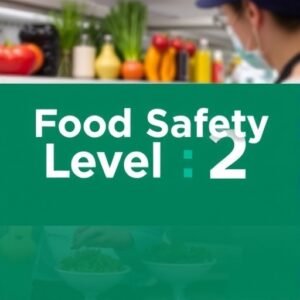Introduction to Food Allergens
Food allergies have become a significant public health concern, affecting millions of people worldwide. In the food service industry, food allergens present a critical safety issue, and improper handling of allergenic ingredients can lead to severe allergic reactions. The Introduction to Allergens course is designed to educate food handlers, kitchen staff, and food service workers on the risks associated with allergens and how to manage them effectively to prevent cross-contamination. By understanding the importance of allergen safety, employees can ensure a safe dining experience for individuals with food allergies.
Why Allergen Awareness is Important
Allergens are substances in food that can cause an allergic reaction in some people. These reactions range from mild symptoms like hives or rashes to life-threatening anaphylactic shock. There are 14 major allergens identified under food safety regulations, including common ingredients such as peanuts, gluten, dairy, eggs, and shellfish. In many countries, food businesses are legally required to inform customers about potential allergens in their food products, making allergen training a vital part of food safety practices.
An allergic reaction can occur if an individual consumes food that contains even trace amounts of an allergen they are sensitive to. For businesses, this can result in serious health risks for customers, legal consequences, and damage to reputation. Ensuring that staff are educated about allergens and how to safely handle and prepare food containing allergens is a crucial step in preventing these risks.
Course Content and Key Learning Objectives
The Introduction to Allergens course covers a range of important topics that help food handlers understand allergens and prevent allergic reactions in food service settings. Key learning objectives include:
- What are Food Allergens?: Participants will learn about the 14 major allergens, including common foods that contain them and the potential health risks they pose to allergic individuals.
- Symptoms of Allergic Reactions: It is essential to recognize the symptoms of an allergic reaction, which may range from mild to severe. The course provides detailed guidance on how to spot symptoms and take immediate action if a reaction occurs.
- Cross-Contamination and Allergen Control: One of the most critical aspects of allergen safety is preventing cross-contamination. This course teaches learners how to handle allergenic ingredients properly to avoid cross-contact with non-allergenic foods, including best practices for storing, preparing, and serving food.
- Labeling and Communication: Accurate labeling of allergens is essential to ensure that customers with food allergies can make informed choices. The course covers proper food labeling practices, including the importance of clear communication with customers regarding the presence of allergens in food.
- Legal Requirements and Regulations: Businesses must comply with local and national laws regarding allergens. Learners will understand the legal obligations they have under food safety regulations, such as providing allergen information and preventing allergen contamination.
- Safe Handling and Storage Practices: The course provides practical tips on how to store, handle, and prepare allergenic foods to minimize the risk of cross-contamination. This includes using separate utensils, equipment, and storage areas for allergenic ingredients.
Who Should Take the Introduction to Allergens Course?
This course is designed for all individuals involved in food preparation, handling, and service. It is suitable for:
- Cooks and Kitchen Staff: Those responsible for preparing and cooking food will benefit from knowing how to handle allergens safely and prevent cross-contamination in the kitchen.
- Restaurant and Café Staff: Servers, waitstaff, and front-of-house employees play a key role in communicating allergen information to customers, making it essential for them to understand allergen safety.
- Catering Professionals: Catering staff working with large volumes of food, especially when preparing meals for events, must be well-versed in allergen safety to ensure customer safety.
- Food Manufacturers: Individuals working in food production or packaging will learn how to ensure allergen labeling and compliance with industry regulations.
- Food Safety Managers: Those responsible for overseeing food safety and training in restaurants, cafeterias, and catering services will gain the tools needed to enforce allergen safety policies effectively.
Course Format and Delivery
The Introduction to Allergens course is designed to be engaging and accessible, using a combination of theoretical knowledge and practical guidance. The course typically includes:
- Interactive Learning: The course utilizes multimedia elements such as videos, quizzes, and case studies to engage learners and reinforce key concepts.
- Practical Scenarios: Learners will be presented with real-life examples and scenarios in which they must identify allergens, assess risks, and apply safety measures.
- Quizzes and Assessments: After completing each module, participants are tested with quizzes to assess their understanding of the material and ensure they can apply what they have learned.
- Certification: Upon successful completion of the course, learners will receive a certificate of completion, demonstrating their understanding of allergen safety and food handling.
Benefits of Completing the Course
The Introduction to Allergens course offers several key benefits for both individuals and businesses:
- Improved Food Safety: Food handlers will be equipped with the knowledge to prevent allergen contamination and ensure safe food preparation for all customers, including those with food allergies.
- Compliance with Regulations: Businesses will ensure they meet legal obligations and regulations regarding allergen labeling and safe food handling, avoiding potential fines and legal issues.
- Enhanced Customer Trust: By demonstrating a commitment to allergen safety, food businesses can build customer trust and loyalty, especially among those with food allergies.
- Reduced Risk of Allergic Reactions: Proper training reduces the risk of allergic reactions in customers, helping to prevent severe health consequences and protect the reputation of the business.
Enroll Today
Enhance your knowledge of allergen safety and food handling by enrolling in the Introduction to Allergens course today. Equip yourself with the tools needed to create a safer food environment for all customers and improve your business’s food safety practices.
Note: We offer the certain courses in partnership with leading training providers to offer the best learning experience and competitive pricing. For more information regarding course availability, enrollment, and pricing, please contact us or visit our Linkedin page. Our team is available to assist with any questions you may have regarding the course content or the registration process.
Explore our wide range of courses. Visit Managing Safely, ProQual NVQs, Level 3, 6, 7, ISO Lead Auditor and other short courses. To learn more contact us or visit our Linkedin or Facebook page.







